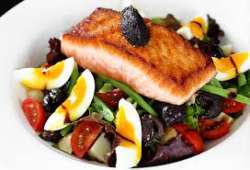A high-protein diet could increase the risk of heartfailure in middle-aged men, suggests a research.However, proteins from fish and eggs were not associated with heart failure risk in this study by University of Eastern Finland.Despite the popularity of high-protein diets, there is little research about how diets high in protein might increase the risk of heart failure in men.
"As many people seem to take the health benefits of high-protein diets for granted, it is important to make clear the possible risks and benefits of these diets," said Jyrki Virtanen, study author.
"Earlier studies have linked diets high in protein - especially from animal sources -- with increased risks of type 2 diabetes and even death."
Researchers studied 2,441 men, age 42 to 60, at the study's start and followed them for an average 22 years. Overall, researchers found 334 cases of heart failure were diagnosed during the study and 70 percent of the protein consumed was from animal sources and 27.7 percent from plant sources.
Higher intake of protein from most dietary sources was associated with slightly higher risk. Only proteins from fish and eggs were not associated with heart failure risk in this study, researchers said.
For this study, researchers divided the men into four groups based on their daily protein consumption. When they compared men who ate the most protein to those who ate the least, they found their risk of heart failure was:
-33 percent higher for all sources of protein
-43 percent higher for animal protein
-49 percent higher for dairy protein
-17 percent higher for plant protein
(With ANI Inputs)

